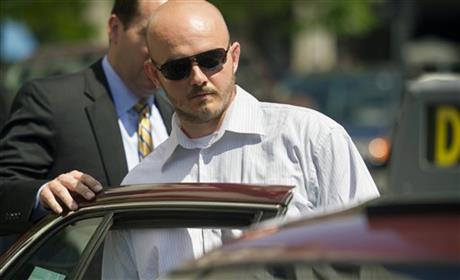
By PETE YOST
Former Blackwater Worldwide guard Nicholas Slatten enters a taxi cab as he leaves federal court in Washington, Wednesday, June 11, 2014, after the start of his first-degree murder trial. Slatten and three other Blackwater Worldwide guards are on trial for the killing of 14 Iraqi civilians and the wounding of 18 others in bloodshed that inflamed anti-American sentiment around the globe. (AP Photo/Cliff Owen)
Nicholas Slatten
Former Blackwater Worldwide guard Nicholas Slatten leaves federal court in Washington, Wednesday, June 11, 2014, after the start of his first-degree murder trial. Slatten and three other Blackwater Worldwide guards are on trial for the killing of 14 Iraqi civilians and the wounding of 18 others in bloodshed that inflamed anti-American sentiment around the globe. (AP Photo/Cliff Owen)
Nicholas Slatten
Former Blackwater Worldwide guard Nicholas Slatten leaves federal court in Washington, Wednesday, June 11, 2014, after the start of his first-degree murder trial. Slatten and three other Blackwater Worldwide guards are on trial for the killing of 14 Iraqi civilians and the wounding of 18 others in bloodshed that inflamed anti-American sentiment around the globe. (AP Photo/Cliff Owen)
Evan Liberty
Former Blackwater Worldwide guard Evan Liberty arrives at federal in Washington, Wednesday, June 11, 2014. After years of delays, four former guards from the security firm Blackwater Worldwide are facing trial in the killings of 14 Iraqi civilians and the wounding of 18 others in bloodshed that inflamed anti-American sentiment around the globe. (AP Photo/Cliff Owen)
Evan Liberty
Former Blackwater Worldwide guard Evan Liberty, right, arrives at federal in Washington, Wednesday, June 11, 2014. After years of delays, four former guards from the security firm Blackwater Worldwide are facing trial in the killings of 14 Iraqi civilians and the wounding of 18 others in bloodshed that inflamed anti-American sentiment around the globe. (AP Photo/Cliff Owen)
Prev
1 of 5
Next
WASHINGTON (AP) — Four former Blackwater Worldwide security guards went on trial Wednesday in the killings of 14 Iraqis and the wounding of at least 18 others.
Over the next few days, a jury of 12 residents from the District of Columbia will be chosen from a pool of 111 people to decide the guards’ fate.
The trial is expected to last months.
The judge overseeing the trial, Royce Lamberth, has been a U.S. district judge for over 25 years and he has a military background. He served as a captain in the Army’s Judge Advocate General’s Corps from 1968 to 1974, including three years at the Pentagon.
The prospective jurors filled out 26-page questionnaires that delved into whether they had any personal experience with excessive use of force by security guards; whether they would be able to follow testimony from Arabic-speaking witnesses through a translator; and whether they have strong feelings about the war in Iraq or the prosecution of American citizens for acts committed in a war zone .
In a brief proceeding, the judge instructed the prospective jurors not to read or watch anything about the case and he specifically mentioned social media. No text messaging about the case. No Twitter.
“Just don’t do it,” he said. “Just stick to the evidence” in the courtroom.
Lamberth gave no indication to the prospective jurors that the guard who faces the most serious charge is asking that he be tried separately from the other three.
The Justice Department opposes the request by Nicholas Slatten, who is charged with first-degree murder. Details of the request and the prosecutors’ response are sealed from public view for now. In a court filing, federal prosecutors referred to the guard’s request to sever his case.
The other three guards — Paul Slough, Evan Liberty and Dustin Heard — are charged with manslaughter, attempted manslaughter and gun charges.
Lamberth told each of the four defendants and their lawyers to stand up and be introduced. He reminded the members of the jury pool that the guards are presumed innocent and explained that they are to fill out detailed questionnaires in an effort to ensure that they can act fairly and impartially.
On Thursday, the judge, prosecutors and lawyers for the defendants will spend the day questioning the prospective jurors.
Slatten could be sentenced to life in prison if convicted. The others face a mandatory minimum penalty of 30 years in prison if convicted of the gun charge and at least one other charge.
The shootings occurred Sept. 16, 2007, at the Nisoor Square traffic circle in Baghdad.



